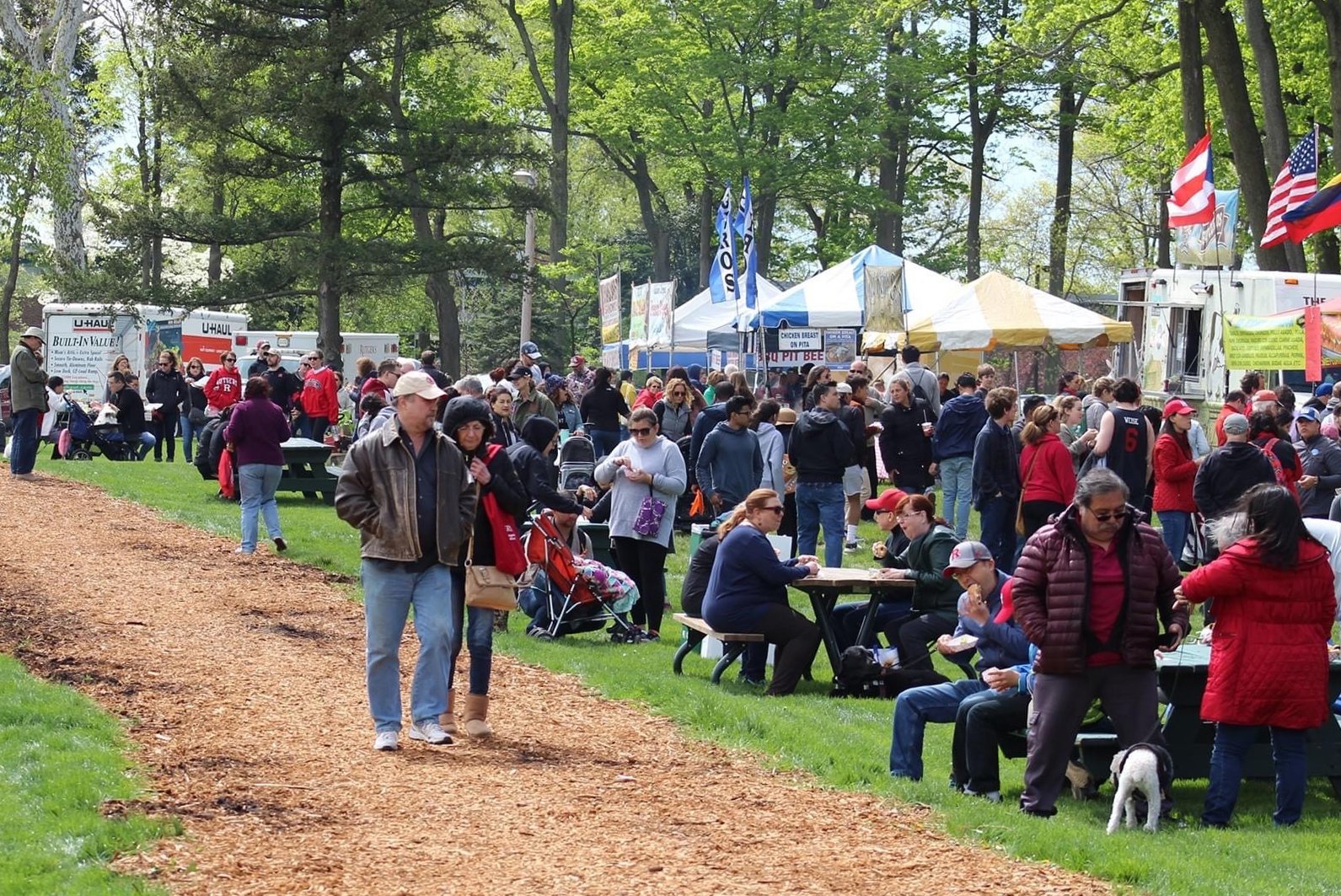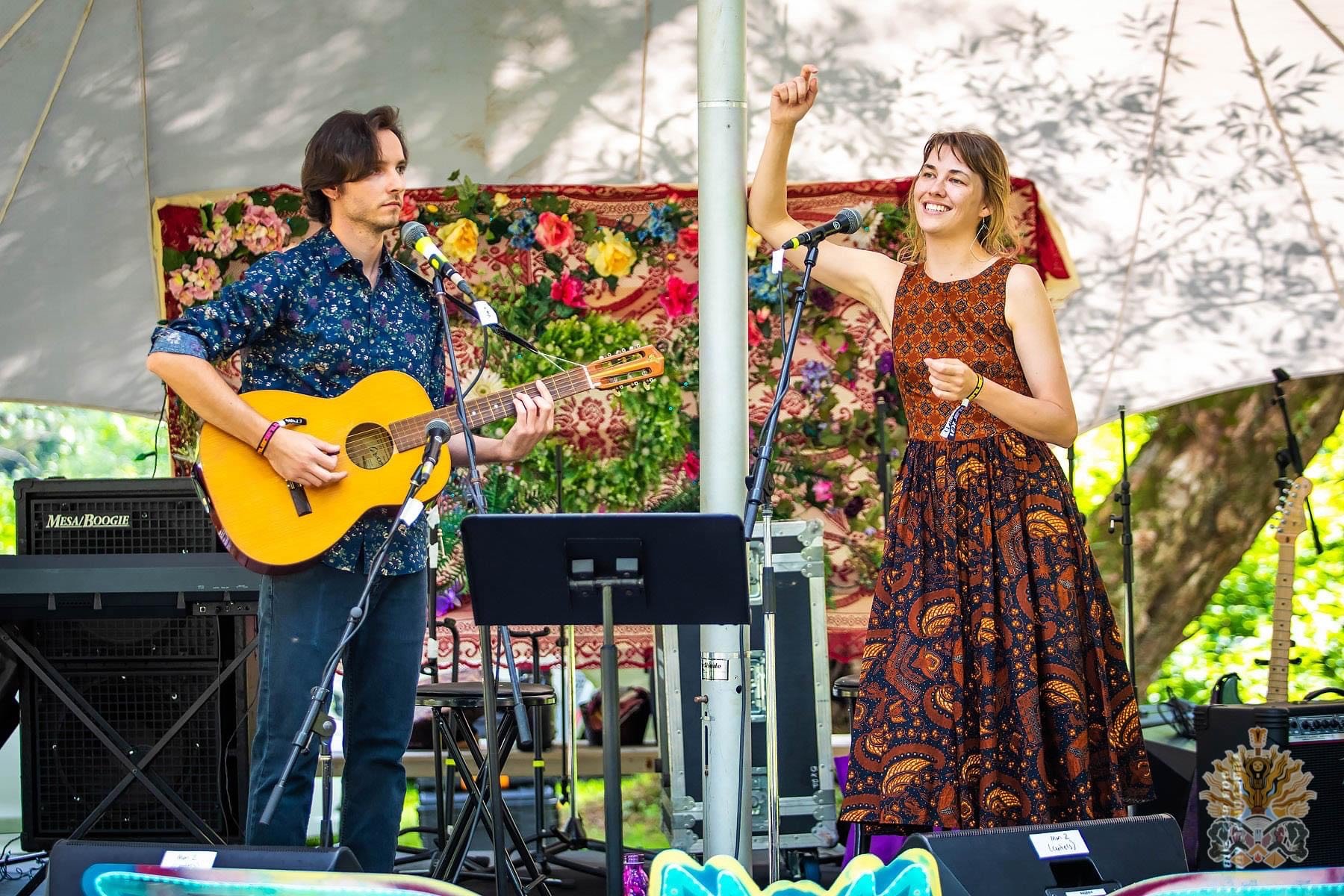New Jersey Folklife Festival Bridges Tradition and Innovation
As we stroll through our neighborhoods at dinner time and the aromas of garlic, cumin, fenugreek, chilies, cabbages and tomatoes waft through the air, we are reminded that one in five people in the state is from somewhere else. Each community that settles in New Jersey brings with it a wealth of folkways. The New Jersey Folklife Festival has been celebrating this for nearly half a century.
The free, outdoor, nonprofit event, sponsored by the American studies department at Rutgers University, will take place on Rutgers’ Cook/Douglass campus Saturday, April 29. There are two 20x40’ audience tents for shade or rain, but festivalgoers are welcome to bring lawn chairs. There is a shuttle bus for those arriving by train or parking elsewhere.
The main stage will include folk musicians medukha, Jackson Pines, Sean Tobin, Laki Bali and Yeimy Gamez Castillo.
The heritage area, in partnership with The Arts Institute of Middlesex County, includes a Foodways tent featuring the cuisines of Peru, Afghanistan, Mexico and others. Local chefs will share recipes and food traditions and free ingredient kits will be distributed to families through the REPLENISH food pantry network.
There will be food vendors to sate appetites for the above-named cuisines, and a Craft Path with a juried selection of craft vendors.
Established in 1975, the festival is the oldest continuously run folk festival in the state. Managed by a team of Rutgers undergrads, the festival attracts more than 15,000 people and is one of the City of New Brunswick's largest regularly scheduled events. The mission is to preserve and protect the music, culture, and arts of the diverse ethnic and cultural communities within the state.
“The festival has been a launching pad for hundreds of students who gained valuable career experience and confidence that has served them well over the years,” founder and folklorist Angus Kress Gillespie wrote in an essay that can be read in full on the festival’s Wikipedia page.
The 2023 festival theme is “New Directions in Folk,” which highlights musicians who are bringing tradition and social justice into conversation with the present, the future and the avant-garde. “New Directions in Folk is an evolving program of performances and workshops that has grown out of our longstanding presentation of singer-songwriters at the festival,” says festival director Maria Kennedy. “We want to highlight the connections musicians are making between tradition and innovation in the crossover from heritage to popular music, and also shine a light on the long tradition of social justice in folk music.”
Jackson Pines is a band of friends from the Pine Barrens. Combining minimalistic acoustic arrangements and taking cues from the ethos of folk, blues, and indie rock, Jackson Pines tells stories of hard times, overflowing love, disappointment and hope.
Born and raised on the New Jersey shore, Sean Tobin was influenced by folk-singing troubadours and high-energy rockers.
Yeimy Gamez Castillo (b. Laz Paz, Honduras 1997) is a multidisciplinary storyteller raised and based in the unceded lands of the Lenni-Lenape: current day Newark. A community organizer, songwriter, poet and music producer, her sonic and literary praxis are inspired by her queer and city-bound immigrant upbringing.
Laki Bali
Laki Bali delivers an esoteric blend of exotically ancient yet modern music. Says the band’s promotional materials: “A swirling romp of sound that is equal parts foot stomping and face puckering. Come with no expectations other than to have some wild fun and dance in ways you never have before.”
Medukha is one of two bands serving as artist-in-residence at this year’s festival. “I happened to know the artists of medukha because several of them are part of the Ukrainian Village Voices group, who performed at the festival last year,” says Kennedy. “UVV performs very traditional folk music from Ukraine, and when I found out that some members were performing similar repertoire but in a more avant-garde style, I thought it would be interesting to explore that in a workshop.” (The self-described Slavic psych rock band was to have given a workshop “Reimagining Roots” in arranging folk music that, due to the Rutgers strike, has been postponed until fall.)
Medukha
Steeping age-old village melodies in contemporary psych-rock soundscapes, medukha sprouted in 2020 from a live-streamed performance for Razom for Ukraine, according to the band’s press materials. Razom, which means “together” in Ukrainian, is a nonprofit based in New York City whose network of volunteers work around the world to “unlock the potential of Ukraine.”
Medukha began life as a duo, with Asia Mieleszko (pronounced “ah-shah mye-lesh-ko”) on lead vocals, synth, drymba (jaw harp), and melodica; and Max Temnogorod on guitar and vocals. Subsequently, they added James Kogan, bass, and Blake Suben, drums.
Also a mezzosoprano and conductor, Mieleszko “moonlights as a dilettante harpist, retired pianist rediscovering impressionism, and diner coffee devotee,” according to her bio. “Her musical endeavors oscillate between preserving the (very) old and pioneering the daringly new.” She also helms the AEON ensemble, which has performed at Carnegie Hall, Symphony Space, the DiMenna Center and Princeton University, as well as “your local dive bar.” The multihyphenate writes for Strong Towns, designs websites, teaches, photographs festivals and “can be found wherever Wi-Fi is reliable, typically along Amtrak's Northeast Corridor.”
The foursome has strong ties to Ukraine. Mieleszko is Polish, but has been engaging with Ukrainian folk culture for years in her role as musical director of Ukrainian Village Voices, the New York City-based performance group whose mission is to study, preserve, and perform the polyphonic traditions of Ukraine's villages. Temnogorod was born in Ukraine and came to the U.S. at age 3. Kogan and Suben have Ukrainian and Soviet roots as well, and all have performed, at one point, with Ukrainian Village Voices.
Mieleszko and Temnogorod are based in Philadelphia, and the other half of the band is in Brooklyn, where most of the members grew up (Mieleszko hails from Far Rockaway, Queens).
“Growing up in non-English speaking households in immigrant enclaves of New York City, we’d inevitably reflect on our diasporic, or more accurately, ‘third culture’ identities,” writes Mieleszko in an email. “As a ‘third culture kid’ in the U.S., you're neither fully American nor fully the nationality of your parents: you're this third thing that doesn't totally have a home. The term resonates with us because it highlights the fractures of identity in a way that ‘diaspora’ doesn't. It’s all the more apt when considering the waves of post-Soviet immigration in the 1990s: the distinct culture in which our parents grew up belonged to a place that, by the time they were leaving, no longer existed. In some ways, our parents are strangers to their native lands too.”
Chef Michelle Washington Wilson prepares a dish while being live streamed by interns (Photo courtesy of the Arts Institute of Middlesex County)
Shortly after Russia invaded Ukraine in winter 2022, medukha held a workshop that highlighted songs from the regions of Ukraine most affected by bombardment and military aggression. Titled “Solidarity Through Song,” funds were raised for both Razom for Ukraine and the International Rescue Committee. The workshop was open to all. From the event’s announcement: “Ukrainian folk music is, at its core, a music of the people, for the people. It is made in community, without pretense but not without passion and discipline. As Ukraine suffers immeasurable losses, we want to lift up the songs of Ukraine’s vibrant villages whose musical legacy and culture at large is threatened by the horror of war.”
This year’s festival can also be viewed through livestream.
LINKS
New Jersey Folklife Festival
Jackson Pines
Sean Tobin
Yeimy Gamez Castillo
Medukha








